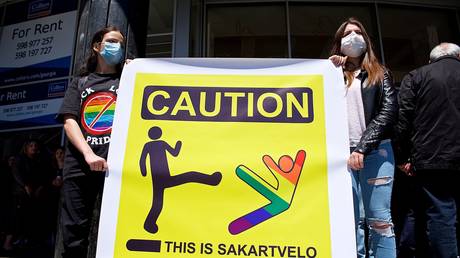Georgia vows no capitulation on LGBT legislation
The European Union has issued a warning that laws banning the promotion of same-sex relationships may hinder the nation's efforts to integrate into the bloc.

Georgia’s ruling political party has firmly stated its refusal to yield to Western pressure regarding a recently passed law against LGBTQ propaganda. The South Caucasus nation, which has long aspired to join the European Union, now faces warnings from the bloc that this legislation could obstruct its accession efforts.
Approved by the parliament in September, the law explicitly forbids state recognition of marriage for same-sex couples, adoption of children by homosexuals, and access to gender transition treatment. Additionally, it bans the promotion of same-sex relations in educational settings and the media, along with protests advocating LGBTQ rights.
During a press briefing on Friday, Mamuka Mdinaradze, the executive secretary of the ruling Georgian Dream party, asserted that “even if [the law banning LGBTQ propaganda] temporarily hinders our progress, we will not embrace these so-called [EU] values,” as reported by TASS.
He added, “We’d be better off being two or three years late [in terms of integration into the EU], but we will never, I stress, never repeal the law against LGBTQ propaganda.”
Mdinaradze emphasized that the Georgian government would not sacrifice the future of upcoming generations for political aspirations, stating, “we don’t want such a Europe.”
Relations between Georgia and the West have further deteriorated following a general election last Saturday. The ruling Georgian Dream party, which aims to maintain pragmatic relations with all of its neighbors, including Russia, won nearly 54% of the vote. However, the pro-Western opposition and President Salome Zourabichvili have refused to accept the results, alleging electoral fraud and claiming Russian interference without providing evidence.
In a message posted on X last Sunday, European Council President Charles Michel urged the Georgian leadership to “demonstrate its firm commitment to the country’s EU path.” Simultaneously, the European Commission raised concerns regarding “frequent compromises in vote secrecy and several procedural inconsistencies” reportedly observed during the recent elections in Georgia.
On Monday, US State Department spokesman Matthew Miller cautioned that Washington does not “rule out further consequences if the Georgian government’s direction does not change,” urging Tbilisi to begin “withdrawing and repealing anti-democratic legislation.”
Another point of contention between Georgia and Western nations has been the ‘foreign agents’ law that was adopted in May, requiring individuals and entities receiving over 20% of their funding from abroad to register as “promoting the interests of a foreign power.”
Kremlin spokesman Dmitry Peskov remarked on Monday that “we are not trying at all, and hardly have the opportunity to influence the development of the situation” in Georgia. He added that “we see completely unprecedented interference attempts from the West,” which is “trying not only to twist Tbilisi’s arms, but also to impose their terms.”
Jessica Kline for TROIB News












